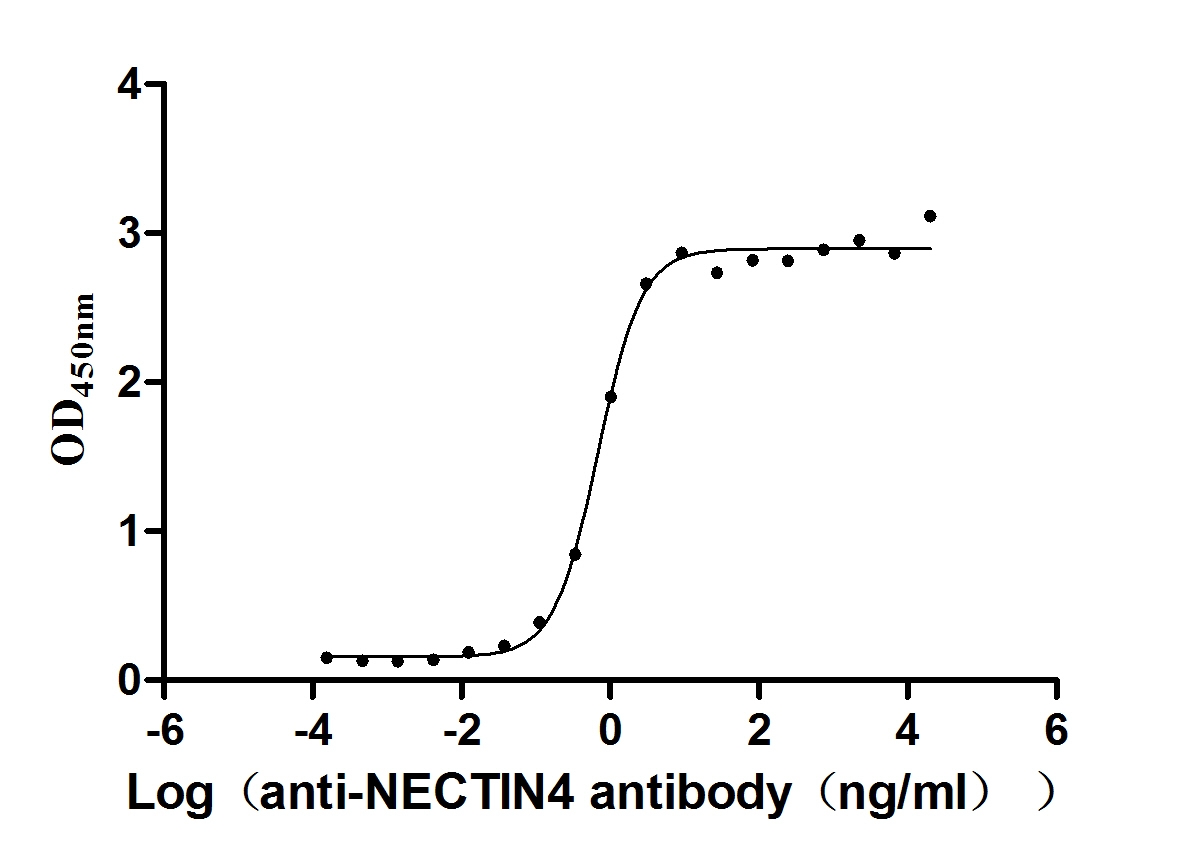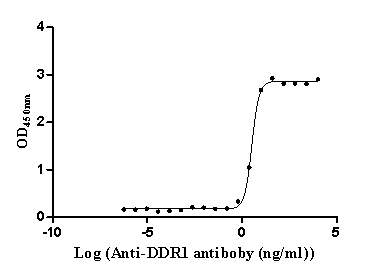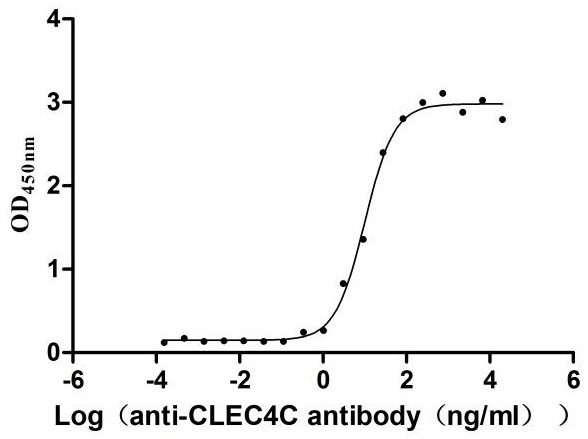Recombinant Mouse Peptidyl-prolyl cis-trans isomerase F, mitochondrial (Ppif)
-
中文名稱:小鼠Ppif重組蛋白
-
貨號:CSB-YP860377MO
-
規(guī)格:
-
來源:Yeast
-
其他:
-
中文名稱:小鼠Ppif重組蛋白
-
貨號:CSB-EP860377MO
-
規(guī)格:
-
來源:E.coli
-
其他:
-
中文名稱:小鼠Ppif重組蛋白
-
貨號:CSB-EP860377MO-B
-
規(guī)格:
-
來源:E.coli
-
共軛:Avi-tag Biotinylated
E. coli biotin ligase (BirA) is highly specific in covalently attaching biotin to the 15 amino acid AviTag peptide. This recombinant protein was biotinylated in vivo by AviTag-BirA technology, which method is BriA catalyzes amide linkage between the biotin and the specific lysine of the AviTag.
-
其他:
-
中文名稱:小鼠Ppif重組蛋白
-
貨號:CSB-BP860377MO
-
規(guī)格:
-
來源:Baculovirus
-
其他:
-
中文名稱:小鼠Ppif重組蛋白
-
貨號:CSB-MP860377MO
-
規(guī)格:
-
來源:Mammalian cell
-
其他:
產品詳情
-
純度:>85% (SDS-PAGE)
-
基因名:
-
Uniprot No.:
-
別名:Ppif; Peptidyl-prolyl cis-trans isomerase F; mitochondrial; PPIase F; EC 5.2.1.8; Cyclophilin D; CyP-D; CypD; Cyclophilin F; Rotamase F
-
種屬:Mus musculus (Mouse)
-
蛋白長度:Full Length of Mature Protein
-
表達區(qū)域:30-206
-
氨基酸序列C SDGGARGANS SSGNPLVYLD VGADGQPLGR VVLELKADVV PKTAENFRAL CTGEKGFGYK GSTFHRVIPA FMCQAGDFTN HNGTGGRSIY GSRFPDENFT LKHVGPGVLS MANAGPNTNG SQFFICTIKT DWLDGKHVVF GHVKEGMDVV KKIESFGSKS GKTSKKIVIT DCGQLS
-
蛋白標簽:Tag?type?will?be?determined?during?the?manufacturing?process.
The tag type will be determined during production process. If you have specified tag type, please tell us and we will develop the specified tag preferentially. -
產品提供形式:Lyophilized powder
Note: We will preferentially ship the format that we have in stock, however, if you have any special requirement for the format, please remark your requirement when placing the order, we will prepare according to your demand. -
復溶:We recommend that this vial be briefly centrifuged prior to opening to bring the contents to the bottom. Please reconstitute protein in deionized sterile water to a concentration of 0.1-1.0 mg/mL.We recommend to add 5-50% of glycerol (final concentration) and aliquot for long-term storage at -20℃/-80℃. Our default final concentration of glycerol is 50%. Customers could use it as reference.
-
儲存條件:Store at -20°C/-80°C upon receipt, aliquoting is necessary for mutiple use. Avoid repeated freeze-thaw cycles.
-
保質期:The shelf life is related to many factors, storage state, buffer ingredients, storage temperature and the stability of the protein itself.
Generally, the shelf life of liquid form is 6 months at -20°C/-80°C. The shelf life of lyophilized form is 12 months at -20°C/-80°C. -
貨期:Delivery time may differ from different purchasing way or location, please kindly consult your local distributors for specific delivery time.Note: All of our proteins are default shipped with normal blue ice packs, if you request to ship with dry ice, please communicate with us in advance and extra fees will be charged.
-
注意事項:Repeated freezing and thawing is not recommended. Store working aliquots at 4°C for up to one week.
-
Datasheet :Please contact us to get it.
靶點詳情
-
功能:PPIase that catalyzes the cis-trans isomerization of proline imidic peptide bonds in oligopeptides and may therefore assist protein folding. Involved in regulation of the mitochondrial permeability transition pore (mPTP). It is proposed that its association with the mPTP is masking a binding site for inhibiting inorganic phosphate (Pi) and promotes the open probability of the mPTP leading to apoptosis or necrosis; the requirement of the PPIase activity for this function is debated. In cooperation with mitochondrial p53/TP53 is involved in activating oxidative stress-induced necrosis. Involved in modulation of mitochondrial membrane F(1)F(0) ATP synthase activity and regulation of mitochondrial matrix adenine nucleotide levels. Has anti-apoptotic activity independently of mPTP and in cooperation with BCL2 inhibits cytochrome c-dependent apoptosis.
-
基因功能參考文獻:
- Cyclophilin D is an important but non-obligatory regulator of mitoflash activity in cardiac muscle, whereas it is dispensable in the skeletal muscle, due in part to differential cyclophilin D expression. PMID: 26746144
- Both male and female cypD heterozygous but not gene knockout mice exhibited increased lifespans compared to wild-type littermates, associated with alterations in the protein expression of some markers, albeit without exhibiting changes in behaviour. PMID: 28288917
- Ablation of Cyclophilin D Results in an Activation of FAK, Akt, and ERK Pathways in the Mouse Heart. PMID: 28230282
- Binding of signal transducer and activator of transcription 3 (STAT3) to cyclophilin D (CypD) was important for reducing mitochondrial reactive oxygen species (ROS) production after oxidative stress. PMID: 28351946
- these data demonstrate that mitochondria are impaired in aging bone and that CypD deletion protects against this impairment to prevent bone loss. This implicates CypD-regulated MPTP and mitochondrial dysfunction in the impairment of bone cells and in aging-related bone loss. PMID: 27183225
- Ppif+/+ and Ppif-/- eosinophils exhibited no significant difference in apoptosis or secondary necrosis. PMID: 26893161
- Ischemic postconditioning might prevent lethal reperfusion injury through an increased SIRT3 activity and subsequent attenuation of CyPD acetylation at reperfusion. PMID: 25871830
- These findings reveal the role of HAX-1 in regulating cyclophilin-D levels via an Hsp90-dependent mechanism, resulting in protection against activation of mPTP and subsequent cell death responses PMID: 26553996
- study identifies a novel signaling pathway composed of E2F1, miR-30b and CypD that regulates myocardial necrosis. PMID: 25301066
- It is concluded that CypD sensitizes the brain mitochondria to PT, and its inhibition by CsA or CypD absence improves the complex I-related mitochondrial function and increases mitochondria stability against Ca(2+) stress. PMID: 26032335
- Data indicate that Ppif protein cyclophilin D (CypD)-dependent protein kinase A (PKA)/cAMP regulatory-element-binding (CREB) signaling is responsible for amyloid beta (Abeta)-induced synaptic injury. PMID: 23507145
- It regulates Parkinson's disease development. PMID: 24325796
- Ablation of CypD leads to changes in the mitochondrial acetylome which may contribute to altered mitochondrial metabolism in CypD-deficient mice. PMID: 24062335
- These results suggest a physiologic function for CypD and the mitochondrial permeability transition in the regulation of starvation-induced autophagy. PMID: 20364102
- new insights into CypD-dependent mitochondrial mPTP and signaling on mitochondrial trafficking in axons and synaptic degeneration in an environment enriched for Abeta PMID: 23382999
- Cys-203 residue of CypD is necessary for redox stress-induced activation of mPTP. PMID: 21930693
- Data suggest that, in mitochondria exhibiting intact inner membranes, the absence of cyclophilin D or the inhibition of its binding to F(0)F(1)-ATP synthase by cyclosporin A will affect only matrix adenine nucleotides levels. PMID: 21281446
- Regulation of the mPTP by SIRT3-mediated deacetylation of CypD at lysine 166 suppresses age-related cardiac hypertrophy. PMID: 21212461
- C1qbp could directly bind to CypD. Therefore C1qbp appears to act as an endogenous inhibitor of the MPT pore, most likely through binding to CypD, and thus protects cells against oxidative stress. PMID: 20950273
- The CYPD component of the mPTP is required by myocardial ischemic preconditioning (IPC) to generate mitochondrial ROS and phosphorylate Akt and Erk1/2, major steps in the IPC signalling pathway. PMID: 20400621
- have shown that Ppif(-/-) mice exhibit substantially greater cardiac hypertrophy, fibrosis, and reduction in myocardial function in response to pressure overload stimulation than control mice PMID: 20890047
- cyclophilin D and the mitochondrial permeability transition are critical regulators of beta-cell death caused by Pdx1 insufficiency PMID: 20479245
- mice lacking Cyp D display cognitive dysfunction probably caused by the hypofunction of neurotransmission without developmental abnormalities PMID: 19437409
- results indicate that the CypD-dependent mitochondrial permeability transition regulates some forms of necrotic death, but not apoptotic death PMID: 15800626
- cyclophilin D and the mitochondrial permeability transition are required for mediating Ca2+- and oxidative damage-induced cell death, but not Bcl-2 family member-regulated death PMID: 15800627
- CypD plays an essential role in an cerebral ischemic injury model in which calcium overload and oxidative stress have been implicated. PMID: 16103352
- CyPD-KO mice were (i) more anxious and less explorative in open field and elevated plus maze and (ii) performed better in learning and memory of avoidance tasks, such as active and passive avoidance PMID: 18621101
- Phosphate is essential for inhibition of the mitochondrial permeability transition pore by cyclosporin A and by cyclophilin D ablation PMID: 18684715
- Cyclophilin D gene ablation protects mice from ischemic renal injury. PMID: 19553348
顯示更多
收起更多
-
亞細胞定位:Mitochondrion matrix.
-
蛋白家族:Cyclophilin-type PPIase family
-
數(shù)據(jù)庫鏈接:
Most popular with customers
-
Recombinant Human papillomavirus type 16 Protein E7 (E7) (Active)
Express system: E.coli
Species: Human papillomavirus type 16
-
Recombinant Human Nectin-4 (NECTIN4), partial (Active)
Express system: Mammalian cell
Species: Homo sapiens (Human)
-
Recombinant Human Zymogen granule protein 16 homolog B (ZG16B) (Active)
Express system: Mammalian cell
Species: Homo sapiens (Human)
-
Recombinant Human Epithelial discoidin domain-containing receptor 1 (DDR1), partial (Active)
Express system: Mammalian cell
Species: Homo sapiens (Human)
-
Recombinant Dog B-lymphocyte antigen CD20 (MS4A1)-VLPs (Active)
Express system: Mammalian cell
Species: Canis lupus familiaris (Dog) (Canis familiaris)
-
Recombinant Human Early activation antigen CD69 (CD69), partial (Active)
Express system: Mammalian cell
Species: Homo sapiens (Human)
-
Recombinant Human Myosin regulatory light polypeptide 9 (MYL9) (Active)
Express system: Yeast
Species: Homo sapiens (Human)
-
Recombinant Human C-type lectin domain family 4 member C (CLEC4C), partial (Active)
Express system: Mammalian cell
Species: Homo sapiens (Human)


















